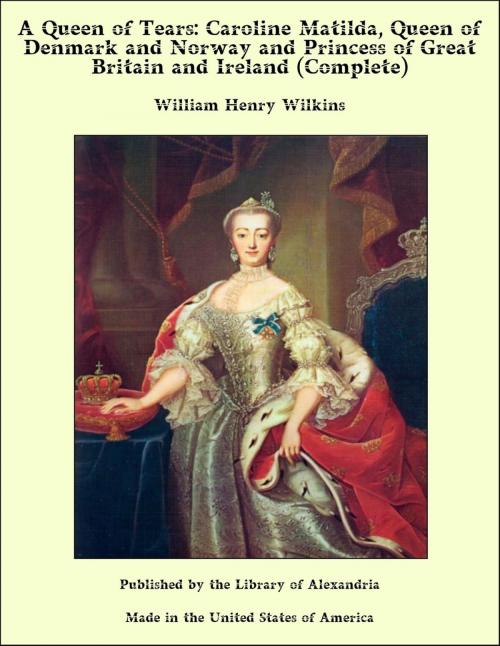A Queen of Tears: Caroline Matilda, Queen of Denmark and Norway and Princess of Great Britain and Ireland (Complete)
Nonfiction, Religion & Spirituality, New Age, History, Fiction & Literature| Author: | William Henry Wilkins | ISBN: | 9781465607409 |
| Publisher: | Library of Alexandria | Publication: | March 8, 2015 |
| Imprint: | Language: | English |
| Author: | William Henry Wilkins |
| ISBN: | 9781465607409 |
| Publisher: | Library of Alexandria |
| Publication: | March 8, 2015 |
| Imprint: | |
| Language: | English |
Caroline Matilda, Queen of Denmark and Norway, Princess of Great Britain and Ireland (a sister of George III.), was born at Leicester House, London, on Thursday, July 22, 1751. She was the ninth and youngest child of Frederick Prince of Wales and of his wife Augusta of Saxe-Gotha, and came into the world a little more than four months after her father’s death. There is a Scandinavian superstition to the effect that children born fatherless are heirs to misfortune. The life of this “Queen of Tears” would seem to illustrate its truth. Caroline Matilda inherited many of her father’s qualities, notably his warm, emotional temperament, his desire to please and his open-handed liberality. Both in appearance and disposition she resembled her father much more than her mother. Some account of this Prince is therefore necessary for a right understanding of his daughter’s character, for, though she was born after his death, the silent forces of heredity influenced her life. Frederick Prince of Wales was the elder son of George II. and of his consort Caroline of Ansbach. He was born in Hanover during the reign of Queen Anne, when the prospects of his family to succeed to the crown of England were doubtful, and he did not come to England until he was in his twenty-second year and his father had reigned two years. He came against the will of the King and Queen, whose cherished wish was that their younger son William Duke of Cumberland should succeed to the English throne, and the elder remain in Hanover. The unkindness with which Frederick was treated by his father had the effect of driving him into opposition to the court and the government. He had inherited from his mother many of the graces that go to captivate the multitude, and he soon became popular. Every cast-off minister, every discontented politician, sought the Prince of Wales, and found in him a ready weapon to harass the government and wound the King. The Prince had undoubted grievances, such as his restricted allowance and the postponement of his marriage to a suitable princess. For some years after Frederick’s arrival in England the King managed to evade the question of the marriage, but at last, owing chiefly to the clamour of the opposition, he reluctantly arranged a match between the Prince of Wales and Augusta, daughter of the reigning Duke of Saxe-Gotha.
Caroline Matilda, Queen of Denmark and Norway, Princess of Great Britain and Ireland (a sister of George III.), was born at Leicester House, London, on Thursday, July 22, 1751. She was the ninth and youngest child of Frederick Prince of Wales and of his wife Augusta of Saxe-Gotha, and came into the world a little more than four months after her father’s death. There is a Scandinavian superstition to the effect that children born fatherless are heirs to misfortune. The life of this “Queen of Tears” would seem to illustrate its truth. Caroline Matilda inherited many of her father’s qualities, notably his warm, emotional temperament, his desire to please and his open-handed liberality. Both in appearance and disposition she resembled her father much more than her mother. Some account of this Prince is therefore necessary for a right understanding of his daughter’s character, for, though she was born after his death, the silent forces of heredity influenced her life. Frederick Prince of Wales was the elder son of George II. and of his consort Caroline of Ansbach. He was born in Hanover during the reign of Queen Anne, when the prospects of his family to succeed to the crown of England were doubtful, and he did not come to England until he was in his twenty-second year and his father had reigned two years. He came against the will of the King and Queen, whose cherished wish was that their younger son William Duke of Cumberland should succeed to the English throne, and the elder remain in Hanover. The unkindness with which Frederick was treated by his father had the effect of driving him into opposition to the court and the government. He had inherited from his mother many of the graces that go to captivate the multitude, and he soon became popular. Every cast-off minister, every discontented politician, sought the Prince of Wales, and found in him a ready weapon to harass the government and wound the King. The Prince had undoubted grievances, such as his restricted allowance and the postponement of his marriage to a suitable princess. For some years after Frederick’s arrival in England the King managed to evade the question of the marriage, but at last, owing chiefly to the clamour of the opposition, he reluctantly arranged a match between the Prince of Wales and Augusta, daughter of the reigning Duke of Saxe-Gotha.















